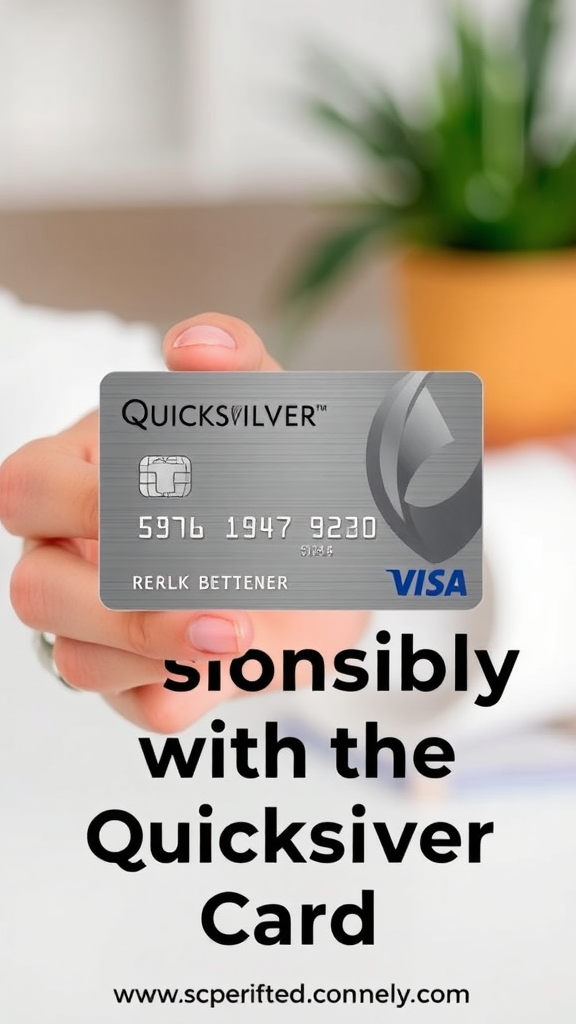Building Credit Responsibly with the Quicksilver Card: Tips and Strategies
Building credit responsibly is crucial for achieving your financial goals, and the Quicksilver Card can be an excellent tool in this journey. With its cash back rewards and user-friendly features, it offers a unique opportunity to not only earn rewards but also to strengthen your credit profile. Here are some tips and strategies to help you make the most out of your Quicksilver Card while building your credit wisely.
Understand Your Credit Score
Before diving into credit-building strategies, it’s important to understand what a credit score is. Credit scores range from 300 to 850, with higher scores reflecting a better credit history. Your credit score directly affects your ability to borrow money and the interest rates you’ll receive. Key factors impacting your credit score include:
- Payment History: Paying your bills on time is the most critical factor.
- Credit Utilization: This is the ratio of your current credit card balances to your credit limits.
- Length of Credit History: How long you’ve had credit accounts can impact your score.
- New Credit: Getting too many new credit inquiries in a short time can hurt your score.
- Types of Credit: Having a mix of credit types can benefit your score.
Use Your Quicksilver Card Wisely
Your Quicksilver Card offers unlimited 1.5% cash back on all purchases, making it easy to earn rewards as you build credit. Here are some strategies to utilize it effectively:
- Make Small, Regular Purchases: Instead of making occasional large purchases, use your card for daily essentials like groceries or gas. This helps you build a consistent payment history.
- Keep Balances Low: Aim to use no more than 30% of your credit limit. This practice helps maintain a healthy credit utilization ratio.
- Pay Your Bill in Full: If possible, pay your balance in full each month to avoid interest charges. This action shows lenders that you are responsible with credit.
- Set Up Automatic Payments: If you often forget payments, consider setting up automatic payments for at least the minimum amount due. This can prevent late fees and help you maintain a positive payment history.
Monitor Your Credit Regularly
Keeping a close eye on your credit report is essential. Many services, including some credit card companies, offer free access to your credit score. Check your credit report regularly for any inaccuracies or fraudulent activities. If you notice discrepancies, resolve them quickly. Monitoring your credit not only keeps you informed but also enables you to track your progress.
Utilize Rewards Smartly
The cash back rewards from your Quicksilver Card can also be part of your credit-building strategy. You can use your rewards to pay down your balance or even to set aside money for emergencies. Here’s how to maximize these rewards:
Ready to earn effortless rewards? Click here to unlock 1.5% cash back on every purchase with the Capital One Quicksilver card!
- Redeem Cash Back Strategically: Consider using your cash back rewards to help pay down your balance or for essential purchases. This keeps your utilization low and can positively impact your credit score.
- Stay Informed on Promotions: Keep an eye out for promotional offers that can provide higher cash back percentages in specific categories. This can help you earn more rewards while still building credit.
Consider an Additional Card Later
Once you establish a good credit history with your Quicksilver Card, consider applying for another card. This can help you build a more diverse credit profile, which can positively influence your credit score. Just remember to apply responsibly and understand how new credit can affect your score.
Building credit responsibly with the Quicksilver Card involves more than just using the card. By understanding your credit score, using your card wisely, monitoring your credit, and utilizing rewards strategically, you can establish a solid credit history. Remember, the goal is to use your credit card as a tool for financial growth, not a source of debt. With these strategies in place, you’re on the right path to building credit successfully and responsibly.
Understanding the Benefits of Responsible Credit Use and Financial Health
Understanding how to use credit responsibly is a crucial part of maintaining financial health. This involves knowing how credit works, the benefits of using it correctly, and the impact it can have on your financial future. Whether you’re considering obtaining a credit card or managing your existing accounts, there are several key benefits to keep in mind.
One of the most significant advantages of responsible credit use is the ability to build a strong credit history. Having a good credit history is essential for securing loans, renting apartments, or even landing a job, as many employers check credit reports during the hiring process. Using credit wisely helps you establish a positive history, which can open doors to better financial opportunities.
When you utilize a credit card, like the Quicksilver Card, and make timely payments, you demonstrate to lenders that you are a trustworthy borrower. Here are some practical steps to take:
Ready to earn effortless rewards? Click here to unlock 1.5% cash back on every purchase with the Capital One Quicksilver card!
- Pay on Time: Always pay your credit card bill by the due date to avoid late fees and negative reporting.
- Keep Balances Low: Aim to use no more than 30% of your credit limit to maintain good credit utilization.
- Establish a Budget: Create a monthly budget to track your spending and ensure you can pay off your balance each month.
Another key benefit of responsible credit use is the potential rewards and cashback opportunities provided by credit cards. The Quicksilver Card, for example, allows you to earn a flat rate of 1.5% cashback on every purchase. This means that every time you spend, you are also working towards earning money back. However, to truly benefit, it’s essential to manage your spending to avoid interest charges, which can negate any rewards earned.
Also, maintaining a good credit score can lead to lower interest rates on loans. When lenders see that you have a solid credit history, they may offer you better terms on mortgages, car loans, or personal loans. Remember, a lower interest rate can save you significant amounts of money over time, making responsible credit use feel rewarding in more ways than one.
Another important aspect is the role of credit in emergencies. Having a credit card can provide a safety net when unexpected expenses arise. For instance, if your car breaks down or a medical bill comes up, a credit card can help you manage those costs, allowing you to pay it off when you’re financially ready. Yet, it’s crucial to avoid using credit for non-essentials to keep your finances healthy.
Using a credit card responsibly can also help improve your financial literacy. As you engage with credit, you learn about managing debts, interest rates, and the importance of maintaining a budget. This knowledge is invaluable and can guide you toward making more informed financial decisions in the future.
Ready to earn effortless rewards? Click here to unlock 1.5% cash back on every purchase with the Capital One Quicksilver card!
It’s also worth noting that many credit cards, including the Quicksilver Card, provide users with regular credit score updates. This feature can be incredibly motivating as you see your credit score rise over time. Keeping an eye on your credit score helps you understand how your credit habits affect your financial health.
However, it’s vital to remember that responsible credit use is more about behavior than just having a credit card. Here are some tips to help you maintain your financial health:
- Monitor Your Credit Report: Regularly review your credit report for errors or inaccuracies and dispute them if necessary.
- Use Credit Sparingly: Avoid maxing out your credit limits and only use what you can afford to pay back each month.
- Educate Yourself: Learn about interest rates, credit scores, and how credit works to enhance your financial skills.
Understanding the benefits of responsible credit use and its impact on your financial health is essential. A strong credit history can lead to better financial opportunities, cash back rewards, and a safety net for emergencies. Building responsible credit habits not only enhances your credit score but also equips you with the knowledge to navigate your financial journey with confidence. Utilizing tools like the Quicksilver Card responsibly is just one way to achieve this goal. Remember, the key is to spend wisely and pay balances in full to reap all the benefits that come with responsible credit use.
Conclusion
Building credit responsibly with the Quicksilver Card not only paves the way for a brighter financial future but also enhances your overall financial health. When you consistently make on-time payments and keep your credit utilization low, you establish a solid credit history that can open doors to better interest rates, higher credit limits, and various financial opportunities.
Understanding the benefits of responsible credit use is essential for anyone looking to improve their financial situation. A strong credit score can lead to savings on loans, rental agreements, and even insurance premiums. These advantages underscore the impact of good credit behavior, which starts with tools like the Quicksilver Card. By leveraging its features thoughtfully—such as cash back rewards and no foreign transaction fees—you can not only enjoy the perks but also stay committed to responsible credit use.
Ready to earn effortless rewards? Click here to unlock 1.5% cash back on every purchase with the Capital One Quicksilver card!
To truly reap the benefits of the Quicksilver Card, consider setting a budget and tracking your spending. This will help you maintain control over your finances while maximizing the rewards you earn. Remember, building credit is a marathon, not a sprint. It requires patience, dedication, and a commitment to ongoing financial education. As you take these steps, you’re not just building credit; you’re investing in a more secure and prosperous financial future.



